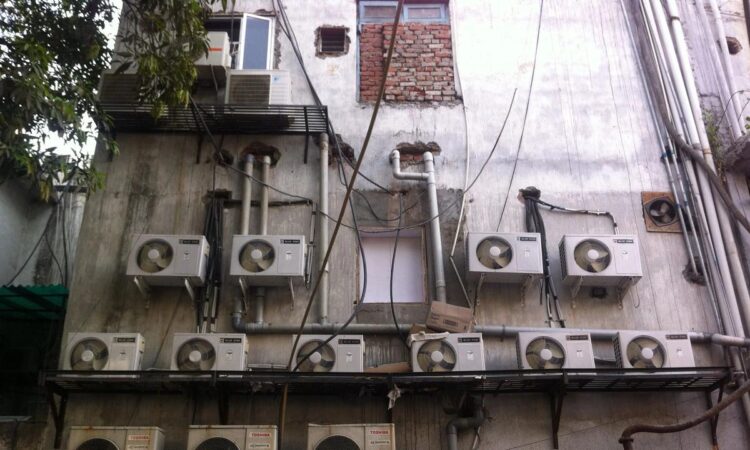
This time of year is known for renewed commitments to the goals that matter to us the most. Even as many folks in India are dealing with historically cold weather, the heat season is merely weeks away. With heatwaves in India threatening the human survivability limit, now, more than ever, we need cooling solutions that won’t further perpetuate this trend of rising temperatures. Fortunately, progress is being made: one relatively unknown breakthrough happened at the Montreal Protocol’s Multilateral Fund (MLF) meeting last month where representatives from across the world discussed funding for phasing down hydrofluorocarbons (HFCs), cooling chemicals that have hundreds to thousands of times the heat-trapping power of carbon dioxide.
A building facade with rows of wall-mounted air conditioners.
HFCs are the fastest-growing climate pollutant and their unchecked growth could add up to 0.5 degrees Celsius to global temperatures by the end of the century. Implementation of the Kigali Amendment, which works to phase down HFCs worldwide, can prevent the release of 70 billion tons of CO2e between now and 2050. The climate benefits of phasing down HFCs can yield greater CO2e emissions gains if energy efficiency during refrigerant transitions is prioritized. The MLF of the Montreal Protocol- the treaty that saved the ozone layer and is now protecting the climate- is working to phase them down. In a major breakthrough last month, the Members of Executive Committee (EXCOM), who manage the Fund, agreed on criteria for pilot projects to maintain and/or enhance energy efficiency of replacement technologies and equipment in the context of the HFC phase down.
The MLF is the critical fuel to keep the work of the Montreal Protocol going. It is a unique financial mechanism that has been assisting developing country parties (referred to as Article 5 countries) to the Montreal Protocol to comply with the treaty and its amendments. With equal membership from developed and developing countries, MLF’s Executive Committee manages the fund’s operations.
Progress to Date
The MLF approved a total funding of over US one billion including support costs in 2022 for nearly 218 projects covering 95 countries. These projects included those related to hydrochlorofluorocarbons (HCFCs) phase outs and HFC phasedown-related projects among others. MLF Members also reached agreements on important policy issues, including increasing funding for institutional strengthening projects, which strengthens the work of the National Ozone Units (NOUs) in developing countries and ensure effective implementation of the work committed in projects under the treaty.
Previous work at the MLF included working on cost funding guidelines for the implementation of the Kigali Amendment, building support for more capacity at the national level in developing countries to implement HFCs phasedown plans, and increasing energy efficiency.
Members of the EXCOM at the 91st Meeting of the MLF in Montreal in December 2022.
Members of the EXCOM also established a funding window to support countries in preparing inventories and developing national plans for managing and disposing of banks of Ozone Depleting Substances (ODS) and HFCs. This step will be necessary to help ensure proper management of these harmful substances and prevent them from leaking into the atmosphere. The analysis on replenishment of the MLF in the coming year will include perusal of energy efficiency and managing and disposal of banks of ODS and HFCs, opening the door to even more funding on these issues next year and beyond. Members discussed but did not yet reach a decision on cost guidelines for the phase down of HFCs. These discussions will continue at the 92nd meeting in 2023.
Energy efficiency in phasing down HFCs
Standing true to its commitments made as part of the Kigali Amendment on energy efficiency, the MLF agreed on criteria for pilot projects to maintain and/or enhance energy efficiency of replacement technologies and equipment in the context of HFC phase down. They also agreed to establish a funding window of US $20 million with a possibility of further increasing the funding window at a future meeting, for these pilot projects.
The HFC phasedown presents an enormous opportunity to improve the energy efficiency of cooling appliances, since all of these will be re-tooled to accommodate new refrigerant gases. The MLF will provide financial support to manufacturing enterprises to redesign products, retool manufacturing lines, and more, to comply with HFC reduction measures. Expanding that effort to simultaneously boost energy efficiency would cut down significantly on the transaction costs of doing so. Since then, the issue has been discussed and deliberated in various ways.
The MLF’s decisions this year bring us one step closer to achieving these additional climate benefits. The funding window opens opportunities for Article 5 countries to initiate projects which could help understand the opportunities and challenges of maintaining and/or enhancing energy efficiency while phasing down HFCs, in both the manufacturing and servicing sectors and costs of relevant energy efficiency related interventions. They can help to design policy and regulatory measures that may be required to support the adoption and market acceptance of energy efficient alternatives. These decisions will also support better coordination between different stakeholders, as energy efficiency and HFCs are typically managed by different government departments.
In the next one to two years, the results of these pilots will help to shape refrigerant transitions and energy efficiency implementation, especially in developing countries.
This was welcome news to countries that have supported this integration of energy efficiency since the beginning. India, for example, has historically supported taking an integrated HFC-energy efficiency approach, and has helped push for it to be part of the Montreal Protocol’s implementation of the Kigali Amendment.
NRDC and partners are heartened by the advancements to date, and look forward to working together to ensure more progress in the year to come.






